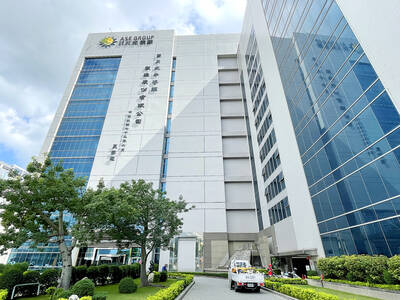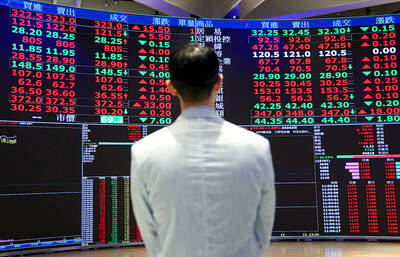The Ministry of Finance said it was inclined to make changes to a proposed energy tax, including calling it an “energy and environment” levy, to minimize resistance to the reform.
Early this month, the tax reform committee unveiled a tax reform plan under which the government would impose an energy levy on gasoline, diesel, fuel oil, natural gas and liquefied petroleum gas through incremental increases each year until 2019.
The reform plan, conducted by Chung-Hua Institution for Economic Research (中經院) President Shaw Dai-gee (蕭代基), would add an energy tax of NT$1.8 per liter to existing gasoline costs each year for the coming decade to help honor President Ma Ying-jeou’s (馬英九) campaign pledge to reduce greenhouse gas emissions and encourage energy conservation.
The government already adds a NT$6.83 commodity tax and NT$2.5 vehicle fuel fee on every liter of gasoline consumed.
Under Shaw’s plan, the costs would be incorporated into the energy levy, which would then total NT$11.13 per liter in the first year and increase by NT$1.8 per liter each year for the following nine years.
If realized, the reform would generate NT$36.1 billion (US$1.1 billion) in tax revenues in the first year and NT$92.6 billion in the second year with the sum expected to hit NT$650 billion in the 10th year, the report showed.
The ministry asked Shaw last week to trim the tax rates for fear the reform would run aground in the legislature given the size of the projected figures.
“The academic appeared receptive to the idea of [milder reform],” a ministry official said on condition of anonymity.
The ministry also decided to refer to the new levy as an “energy and environment” tax to make it sound more favorable to the public, the official said.
With a milder reform, some previously proposed tax cuts to ease the impact of the levy would be unnecessary, the official said, referring to a plan to lower personal and corporate income tax rates by 1 percent each year upon the institution of the green tax.
Furthermore, the ministry has dropped its plan to seek increased deduction amounts for taxable salary incomes, the official said.
However, the proposal to abolish entertainment and stamp taxes remains unchanged, the official said.
Also, the ministry would go ahead and scrap commodity taxes on rubber tires, drinks, plate glass and electric appliances once the new levy is in place, the official said, putting the tax losses at NT$20.7 million.
The tax reform committee is expected to reach a conclusion on the matter in October.

EXPANSION: The investment came as ASE in July told investors it would accelerate capacity growth to mitigate supply issues, and would boost spending by 16 percent ASE Technology Holding Co (ASE, 日月光投控), the world’s biggest chip assembly and testing service provider, yesterday said it is investing NT$17.6 billion (US$578.6 million) to build a new advanced chip packaging facility in Kaohsiung to cope with fast-growing demand from artificial intelligence (AI), high-performance-computing (HPC) and automotive applications. The new fab, called K18B, is to commence operation in the first quarter of 2028, offering chip-on-wafer-on-substrate (CoWoS) chip packaging and final testing services, ASE said in a statement. The fab is to create 2,000 new jobs upon its completion, ASE said. A wide spectrum of system-level chip packaging technologies would be available at

Taiwan’s foreign exchange reserves hit a record high at the end of last month, surpassing the US$600 billion mark for the first time, the central bank said yesterday. Last month, the country’s foreign exchange reserves rose US$5.51 billion from a month earlier to reach US$602.94 billion due to an increase in returns from the central bank’s portfolio management, the movement of other foreign currencies in the portfolio against the US dollar and the bank’s efforts to smooth the volatility of the New Taiwan dollar. Department of Foreign Exchange Director-General Eugene Tsai (蔡炯民)said a rate cut cycle launched by the US Federal Reserve

HEAVYWEIGHT: The TAIEX ended up 382.67 points, with about 280 of those points contributed by TSMC shares alone, which rose 2.56 percent to close at NT$1,400 Shares in Taiwan broke records at the end of yesterday’s session after contract chipmaker Taiwan Semiconductor Manufacturing Co (TSMC, 台積電) hit a fresh closing-high amid enthusiasm toward artificial intelligence (AI) development, dealers said. The TAIEX ended up 382.67 points, or 1.45 percent, at the day’s high of 26,761.06. Turnover totaled NT$463.09 billion (US$15.22 billion). “The local main board has repeatedly hit new closing highs in the past few sessions as investors continued to embrace high hopes about AI applications, taking cues from a strong showing in shares of US-based AI chip designer Nvidia Corp,” Hua Nan Securities Co (華南永昌證券) analyst Kevin Su

Nvidia Corp’s major server production partner Hon Hai Precision Industry Co (鴻海精密) reported 10.99 percent year-on-year growth in quarterly sales, signaling healthy demand for artificial intelligence (AI) infrastructure. Revenue totaled NT$2.06 trillion (US$67.72 billion) in the last quarter, in line with analysts’ projections, a company statement said. On a quarterly basis, revenue was up 14.47 percent. Hon Hai’s businesses cover four primary product segments: cloud and networking, smart consumer electronics, computing, and components and other products. Last quarter, “cloud and networking products delivered strong growth, components and other products demonstrated significant growth, while smart consumer electronics and computing products slightly declined,” compared with the